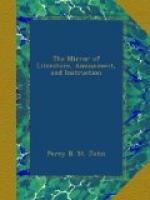* * * * *
A GOOD BISHOP.
The great and good bishop Morton was preferred to the rectory of Long Marston, near York, four years before what is called the great plague began in that city, 1602. During this visitation, “he carried himself with so much heroical charity,” says his biographer, “as will make the reader wonder to hear it.” For the poorer sort being removed to the pest-house, he made it his frequent exercise to visit them with food, both for their bodies and souls. His chief errand was to instruct and comfort them, and pray for them and with them; and, to make his coming the more acceptable, he carried usually a sack of provision with him for those that wanted it. And because he would have no man to run any hazard thereby but himself, he seldom suffered any of his servants to come near him, but saddled and unsaddled his own horse, and had a private door made on purpose into his house and chamber. It was probably during this plague that the village of Simonside (in the chapelry of South Shields) was, according to tradition, so entirely depopulated, that the nearest townships divided the deserted lands. There is another tradition worthy of notice, that when the plague raged with great violence at Shields, the persons who were employed about the salt works entirely escaped the infection.
When the London mob was excited, by the movers of rebellion, against the bishop, this excellent prelate, on his way to the House of Lords, was almost torn to pieces. “Pull him out of his coach!” cried some; others, “nay he is a good man;” others, “but for all that he is a bishop!”—“I have often,” says his biographer, heard him say, he believed he should not have escaped alive if a leading man among that rabble had not cried out, “Let him go and hang himself,” which he was wont to compare to the words of the angel uttered by Balaam’s ass. At that time he was seventy-six years of age, and, on that account, when the protesting prelates were, for this act of duty, committed to the Tower, he was remitted to the custody of the usher; and then, so little had he regarded the mammon of unrighteousness, that he had scarcely wherewith to defray the fees and charges of his confinement.
* * * * *
AMERICAN COMFORTS.
Pittsburgh is full of coal and smoke; in New Orleans the people play cards on Sunday; living is dear at Washington city, and codfish cheap at Boston; and Irishmen are plenty in Pennsylvania, and pretty girls in Rhode Island.
* * * * *
SPIRIT OF THE PUBLIC JOURNALS.
* * * * *
[We need not illustrate the force, or point the moral of the following sketch from the last number of Blackwood’s Magazine. The parents of the writer were of “a serious cast,” and attached to evangelical tenets, which he soon imbibed, together with an occasional tendency to gloom and nervous irritability.]




